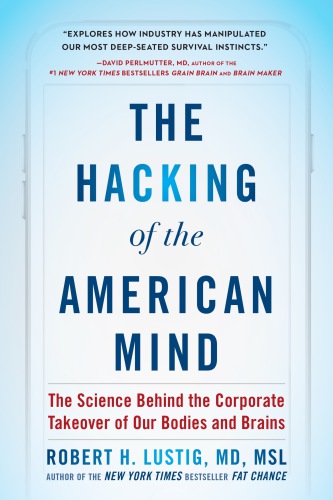
The Hacking of the American Mind
The Science Behind the Corporate Takeover of Our Bodies and Brains
کتاب های مرتبط
- اطلاعات
- نقد و بررسی
- دیدگاه کاربران
نقد و بررسی

July 3, 2017
Pediatric endocrinologist Lustig (The Fat Chance Cookbook, with Heather Millar) makes his unoriginal thesis very clear up front: Americans are miserable and suffer from addiction, depression, and illness because American culture, corporations, and pop psychology promote dopamine-based pleasure and reward over serotonin-mediated contentment and happiness. The result is a “death spiral” for physical and psychological health. Lustig’s strongest tool in making this argument is his ability to lucidly explain neuroscience, specifically regarding the neural pathways developed by pleasure-seeking behaviors and cortisol-driving chronic stress. He also reiterates ideas from his previous books, which share an obsession with a generalized “metabolic syndrome” as the core American affliction and sugar as the most obviously guilty culprit. Though his tone remains authoritative, Lustig’s reach here exceeds his expertise as he also points his finger at antagonists as varied as social media, Big Pharma’s and Big Food’s marketing strategies, and the federal government’s administration of Social Security. His “four Cs” solution—connect, contribute, cope, and cook—urges a return to a slowed-down style of life from before the rise of fast food and the internet. Lustig aims at big thinking but his exposé is mostly unshocking, his ideas rehashed rather than cutting-edge, and his advice curmudgeonly, albeit also humanistic and sensible.

July 15, 2017
I want my MTV--and my doughnuts and my meth. Thus the American mind, racing to attain rewards that entire industries are glad to supply.Lustig (Pediatric Endocrinology/Univ. of California, San Francisco; Fat Chance: Beating the Odds Against Sugar, Processed Food, Obesity, and Disease, 2012, etc.), the chief officer of the nonprofit EatREAL, has written widely on the obesity epidemic, particularly among younger Americans. Here, branching out into realms such as neuroscience, sociology, and even theology, he looks at the reward system whereby the brain lives and dies via serotonin, cortisol, and dopamine, chemicals that drive us to have that one piece of cake too many--or to smoke, snort cocaine, stare into our cellphones, and watch game shows. Medical specialists treat effects, he argues, whereas we should be looking into root causes: not just the chemistry of the brain, driven to seek reward and vulnerable to falling into addiction, but also the economic machine that creates vast industries devoted to choking processed foods with reward-delivering sugar and putting an opioid-supplying pharmacy on every street corner. That economic machine is massively parasitic and spectacularly successful. Lustig leaves it to readers to connect the dots--as he writes, early on, "I'm not going to stick my neck so far out as to say that there has been a conspiracy between different industries and the government to purposefully inflict malice on the public"--and there are plenty of dots to connect. With so much to condemn, the argument is sometimes loose and scattershot, but there's a lot to write about in the vast subject of how the brain works and how capitalism aims to satisfy its every craving, no matter how harmful to body, mind, and society. At the edges where popular science and popular social criticism meet, with interesting if not always sharply limned arguments.
COPYRIGHT(2017) Kirkus Reviews, ALL RIGHTS RESERVED.

August 1, 2017
Lustig returns with a provocative book that aims to rewire the way we think about pleasure versus contentment while examining the government's paramount role in health and wellness. Having exposed the toxic effects of sugar in Fat Chance (2012), he now examines the biology of addiction, depression, and the eternal quest for happiness. He dives into the differences between serotonin and dopamine and into how happiness and pleasure differ as well as how exactly they are effected by what we put in our bodies. His brief neurobiology lesson sets up the rest of the argument, which includes discussions about public health throughout American history as well as analysis of such recent events as implementation of the Affordable Healthcare Act. This persuasive and eye-opening book reveals the downward spiral of our health and happiness and the roles of government and corporations in it and raises the question, Where do you draw the line between marketing and propaganda? Well-researched and witty, Lustig's important inquiry will appeal to diverse readers.(Reprinted with permission of Booklist, copyright 2017, American Library Association.)

























دیدگاه کاربران